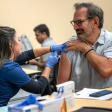By Jeffrey Norris on UCSF.edu
Viral hepatitis chronically infects between 3.5 and 5.2 million people in the U.S. and more than 30,000 in San Francisco, alone — but only about one in three people who are infected know it, according to a report by the U.S. Department of Health and Human Services.
San Francisco is a clinical hot spot for viral hepatitis infection, and UCSF is at the forefront in research, public health programs, and clinical trials to prevent and fight the potentially life-threatening condition.
UCSF faculty and staff in the schools of dentistry, medicine, nursing and pharmacy, the Clinical and Translational Science Institute (CTSI) and UCSF Medical Center are engaged in a range of efforts, sometimes joined by students, often with partners in San Francisco city and county government and in affected populations. They aim to educate individuals at risk for the disease about prevention and vaccination, to identify people who are infected and to ensure that those who need treatment receive it.
Among the UCSF initiatives are:
- a free screening clinic in Chinatown
- the use of a new computerized check-in system in UCSF Medical Center's acute care clinic that screens for individuals at risk for hepatitis B and expedites follow-up care
- public health awareness programs aimed at highly affected populations, including Vietnamese Americans, who have a 1-in-7 incidence of hepatitis B
- screening and prevention outreach for injection drug users at high risk for hepatitis C infection
- participation in the coordination and improvement of citywide activities, through, for example, San Francisco Hep B Free and the San Francisco Health Improvement Partnerships (SF HIP)
- testing new treatments
- investigating the causes of chronic infection, and the reasons why vulnerability to chronic infection and treatment responses vary among individuals.




